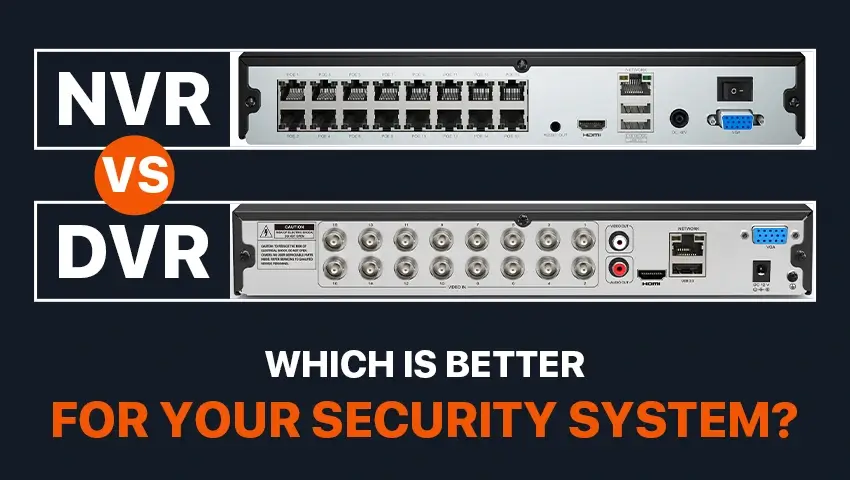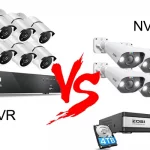When setting up a security system, one of the key decisions you’ll face is choosing between DVR (Digital Video Recorder) and NVR (Network Video Recorder) systems. Both options offer robust surveillance capabilities, but they differ in technology, video quality, installation, and overall flexibility. In this article, we’ll explore the differences between DVR and NVR, and help you decide which is better for your needs.
Contents
What is DVR?
DVR systems have been the backbone of traditional CCTV setups for years. A DVR records footage from analog cameras and stores it locally on a hard drive. The cameras are connected via coaxial cables, and the DVR acts as the central hub that records and stores video footage.
Key Features of DVR:
- Analog Technology: DVR works with analog CCTV cameras, which are connected to the recorder via coaxial cables.
- Cost-effective: DVR systems are generally more affordable than NVR systems, making them a popular choice for budget-conscious buyers.
- Video Quality: While DVR systems provide adequate video quality for basic surveillance needs, they have limitations in terms of resolution.
Pros:
- Budget-friendly solution.
- Simple and reliable for basic monitoring.
Cons:
- Lower resolution compared to NVR.
- Requires more physical wiring, making installation a bit cumbersome.
What is NVR?
NVR systems, on the other hand, use IP (Internet Protocol) cameras that send video signals over a network. NVR systems work by recording digital video from IP cameras, which can be connected through Ethernet cables or even wirelessly.
Key Features of NVR:
- Digital Technology: NVR works with IP cameras, providing higher resolution and better overall video quality.
- Remote Access: Many NVR systems allow remote access, meaning you can monitor your security cameras from anywhere using a smartphone or computer.
- Installation: NVR systems are more flexible because they use network cables or wireless connections, allowing for simpler installations compared to DVR systems.
Pros:
- Higher resolution and better image quality.
- Easier to scale and expand.
Cons:
- More expensive than DVR systems.
- Requires IP cameras, which can be pricier.
Key Differences Between DVR and NVR
1. Technology:
- DVR uses analog cameras and coaxial cables.
- NVR uses digital IP cameras that transmit over a network.
2. Video Quality:
- NVR typically offers better video quality, supporting resolutions like 4K, whereas DVR is limited to lower resolutions.
3. Installation:
- DVR requires physical wiring for cameras, making the setup more complex.
- NVR can use Ethernet or Wi-Fi connections, simplifying installation.
4. Flexibility and Scalability:
- NVR is more flexible, allowing you to add cameras without the need for new wiring.
- DVR is limited in this regard since you need additional wiring for each new camera.
Which is Better for You?
When deciding between DVR and NVR, consider your specific needs:
- Budget: If you are looking for a more affordable option and don’t mind sacrificing some video quality, D VR might be the right choice.
- Video Quality: If you require higher resolution video and more flexibility, NVR is a better option.
- Installation: If you prefer an easier installation process or plan to expand your system, NVR offers more flexibility.
FAQs
1. Can You Upgrade from DVR to NVR?
Yes, it’s possible to upgrade from a DVR to an NVR system, but it may require replacing your analog cameras with IP cameras and adjusting your network infrastructure.
2. Which is Easier to Set Up, DVR or NVR?
NVR systems tend to be easier to set up because they use network cables or Wi-Fi, whereas DVR systems require more physical wiring.
Conclusion
Both DVR and NVR systems have their pros and cons, but overall, NVR offers superior video quality, more flexibility, and ease of installation, making it the preferred option for most modern security setups. However, if you’re on a tight budget or need a basic system, DVR is still a reliable and cost-effective choice. Consider your security needs, budget, and installation preferences before making a decision.

